The Long War of Words: How Oklahoma Tribes Are Fighting To Save Their Languages From Extinction
Published August 2019
By David Joshua Jennings | 21 min read
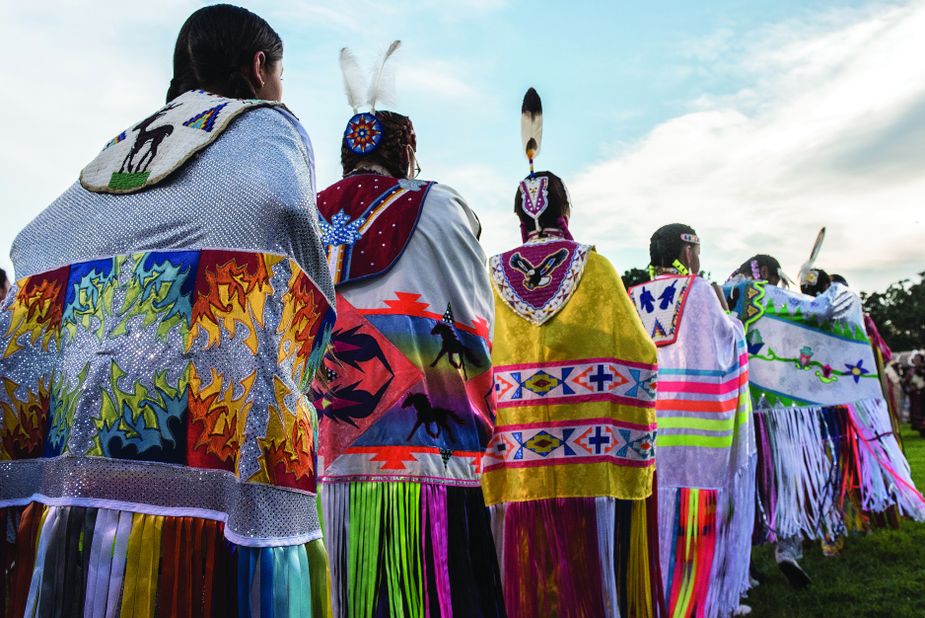
Language programs and cultural events like the annual Sac and Fox powwow in July offer ways for Native Americans to integrate their spoken languages into modern life.
The Long War of Words
Story and Photography by David Joshua Jennings
“I rarely go an hour without my mind returning to the Yuchi class,” Maxine Wildcat Barnett says on a drive through rural Creek County in eastern Oklahoma. “I keep the language and our Yuchi people in my prayers every day.”
Yuchi was Barnett’s first language—the only one her parents spoke. It wasn’t until she was six, when she began public school, that she learned English. As she grew to adulthood in an English-speaking world, however, her familiarity with Yuchi began to fade. Only later in life did she realize the importance of keeping her language alive.
“I was at a conference in Nebraska with about 1,500 women from all over the country,” she says. “The leader said, ‘When I look out over this congregation, I see many colors and types of people. I want one person from each group to lead us in prayer in their own language.’ I was with a group of Creek women, so I felt safe and secure, because surely one of them could pray in Creek. But nobody said a word.”
I felt safe and secure, because surely one of them could pray in Creek. But nobody said a word. Maxine Wildcat Barnett
She looks out the window at the flat yellow countryside surrounding Sapulpa and is silent for a moment.
“That night, something hit me,” says the ninety-one year old. “I wanted to cry out. I promised the Lord, ‘When I get home, I’m going to learn how to praise you in my own language, because you made me who I am, you gave me Yuchi-speaking parents, and I can’t even call out to you in prayer.’ And from then on, I prayed in Yuchi. It feels like God is holding me. That’s why it’s so hard for me to give up the language. When you lose a language, you lose your songs, your culture, the things you used to do together as a family. My language keeps me going.”
As one of three living elders who learned to speak Yuchi as a first language, Barnett is integral to the Yuchi Tribe of Indians’ language revitalization program, and she is determined to spend her remaining years passing her skills to the next generation.
It is this determination that has inspired a group of students to gather around Barnett and the tribe’s two other first-language elders, Vada Tiger Nichwander, who is ninety-five, and Martha Wildcat Squire*, who is ninety-two, in the living room of a small country home in the middle of summer break. For the students and their coordinator, Richard Grounds, executive director of the Yuchi Language Project in Sapulpa, these women and their words are precious. Each time they utter an uncommon word, there is a real possibility that it will be the final time. When they are gone, there will be few books to consult and few other sources of information for those who wish to learn.
*Since the publication of this story, Martha Wildcat Squire passed away in 2018.
Grounds and his students are there to make sure that doesn’t happen. The goal of the Yuchi Language Project is to spread fluency among young members of the tribe, who eventually will pass their fluency on to future generations. The odds, however, are not in their favor. According to the Endangered Languages Catalog published by the University of Hawai’i at Mānoa in 2012, a language goes extinct roughly every three months, and many linguists predict that 50 percent of the remaining 6,500 or so languages in the world will be extinct by the end of this century. In Oklahoma, at least seventeen Native American languages already have gone extinct, and of the twenty-two remaining, only four have more than 1,000 fluent speakers, and six have fewer than ten fluent speakers. With the exception of Cherokee, all Oklahoma Native American languages soon could cease to exist as spoken tongues.
Language shapes everything human beings experience. It contains history and connects people through the millennia to their ancestors. So what exactly dies with a language? What, besides words, is lost?
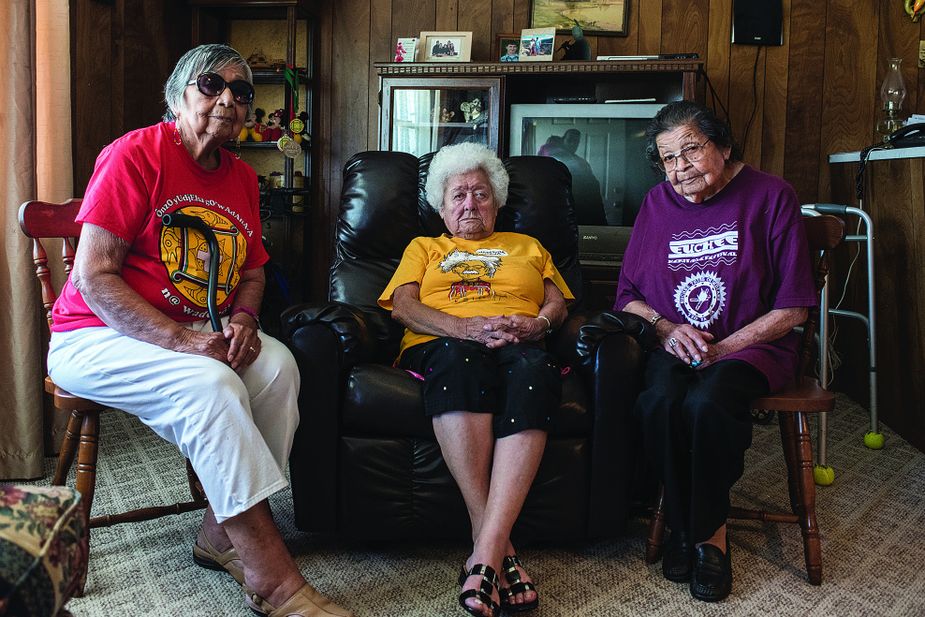
From left, Maxine Wildcat Barnett, Vada Tiger Nichwander, and Martha Wildcat Squire were the only remaining native speakers of the Yuchi language. Since the story was published, Squire passed away in 2018.
How indigenous languages in Oklahoma arrived at their present state of endangerment was no accident of history but the result of centuries of targeted government policy. The biggest initial blow came in the nineteenth century, when many Indian children were removed from their families and relocated to boarding schools, where they were punished if they spoke their languages, a practice that continued well into the twentieth century.
“The schools’ purpose was to cut off the influence of families and elders so that kids wouldn’t learn their songs and stories and would stop speaking their language,” says Grounds. “Often, they would wash their mouths out with soap for speaking their language, the message being, ‘Your language is dirty, and we’re going to punish you for speaking it.’”
Often, they would wash their mouths out with soap for speaking their language, the message being, “Your language is dirty, and we’re going to punish you for speaking it.” Richard Grounds
The strategy was effective.
“They understood they needed to go after children instead of adults, and they were given enough funding to go to every tribe, every household, and every kid,” Grounds says. “It went on for generations.”
Because of the trauma of the boarding school experience, those who survived rarely passed their language to their children.
“They were afraid,” says Terrie Kinsey, language program coordinator for the Sac and Fox Nation. “A lot of people still are afraid of their language—they don’t want their kids and grandkids to go through the experiences they did. The boarding schools left enormous scars on their emotions and mental processes.”
There were other contributing factors, including the Indian Relocation Act of 1956, which aimed to move Native Americans from rural areas to larger, English-speaking cities in order to find work. Another factor, particularly in Oklahoma, was the allotment system—the federal policy of dividing communally held tribal lands into individually owned private property. This spread a tribe’s members over a larger geographic area, weakening communal culture and reducing the number of opportunities to communicate with each other in their native language.
Today, cultural changes are exacerbating this legacy. English is essential to accessing jobs, education, and other opportunities, so many parents do not encourage their children to learn their heritage language, seeing the time and effort necessary to master the language as a potential hindrance to success in life. For the younger generation, the biggest disruptions often are caused by technology.
“What the boarding schools didn’t kill,” Kinsey says, “TVs, phones, iPads, and computers are trying to.”
Roy Boney Jr., manager of the Cherokee Language Program in Tahlequah, says a common cutoff point for native Cherokee speakers—few of whom are under the age of forty—coincides with the rise of television and mass media.
“Cherokee used to be the language of the home, and now it’s a rare occurrence,” he says. “From radio to TV, we need to get our language in those media to get it back in the home.”
A dominant language always will push its way into young minds through television, the Internet, and other forms of technology children are exposed to on a daily basis. Even if children speak Yuchi, how can they text their friends or tweet in anything but English?
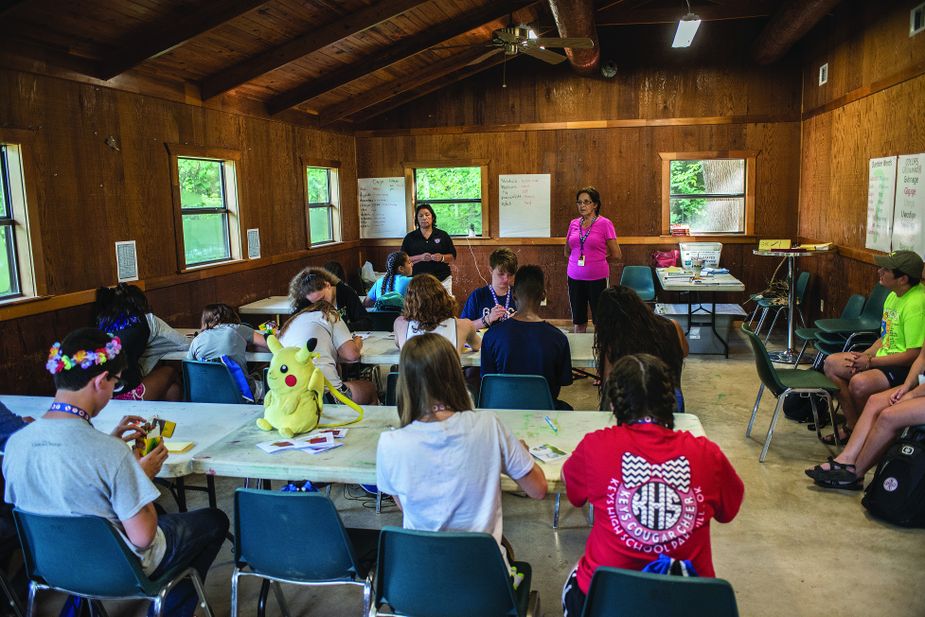
Camp Cherokee in Tahlequah is an annual program that teaches students about Cherokee culture and language as well as math, science, and art.
Does it matter that an obscure language spoken by a few people in rural Oklahoma ceases to exist, and is it worth it, or even possible, to keep these languages alive? What is in a language that makes it worth preserving?
“It makes us stand out,” says Sue Thompson of Tahlequah, a Cherokee who has taught her native language for twenty-five years. “If we were to lose Cherokee, we would lose our humor, and our stories wouldn’t have the same power. We would lose all sorts of medicines. Words are everything. If we didn’t have those words, it would be a dull world for us Cherokees.”
Words have enormous power to convey the unique perspective of the cultures that brought them into being. What does it say about Cherokees, for instance, that they have no word for goodbye, only see you later?
“When you lose language, you lose a part of your culture,” says Kinsey. “You lose a connection with your ancestors, because that’s how they spoke and how the world made sense to them. Culture and language are two halves of a whole. So if you lose your language, you are not whole—you lose that part of you that makes you a Native American.”
To avert this fate, many tribes have taken action. From the time the language crisis was recognized until now has been a blip on the timeline of these languages, so it is hard to measure success. But some tribes—like the Sac and Fox, Yuchi, and Cherokee—are making concentrated efforts. Success for such programs, however, cannot be measured in a few years—or even a few lifetimes.
“You have to start talking in terms of a couple of centuries,” says Jacob Manatowa-Bailey, director of the Sac and Fox Nation of Oklahoma’s Sauk language department. “Not a three- or ten-year plan, but a 200- to 300-year plan.”
Regardless how many native languages are taught in universities, public schools, or community centers, immersion and total fluency among numerous individuals is the only way to keep a language alive.
“Immersion is the heart of bringing new speakers into the language,” Manatowa-Bailey says. “Without immersion, you cannot create new fluent speakers, and fluency is the determining factor in language survival.”
It is a battle that must proceed step by step, and the first step is getting young people motivated to learn. This is why the Yuchi tribe organizes programs like the Annual Yuchi Knowledge Bowl, where kids get medals, their picture in the paper, and respect from the community for their knowledge of Yuchi.
“We want them to be recognized and honored for learning their language,” says Grounds. “Racism and bias still exist, so programs like this are aimed at making kids feel good about themselves and their heritage.”
The Cherokee, meanwhile, have been actively introducing their language and syllabary into Google, Microsoft Windows, Facebook, and other software programs.
“Reaching the younger generation has been a challenge,” says Boney. “That’s why the technology aspect—being able to text in Cherokee, for example—is very important. Then they at least have the option to use it. It’s important not only for maintaining their heritage but for communicating with their peers.”
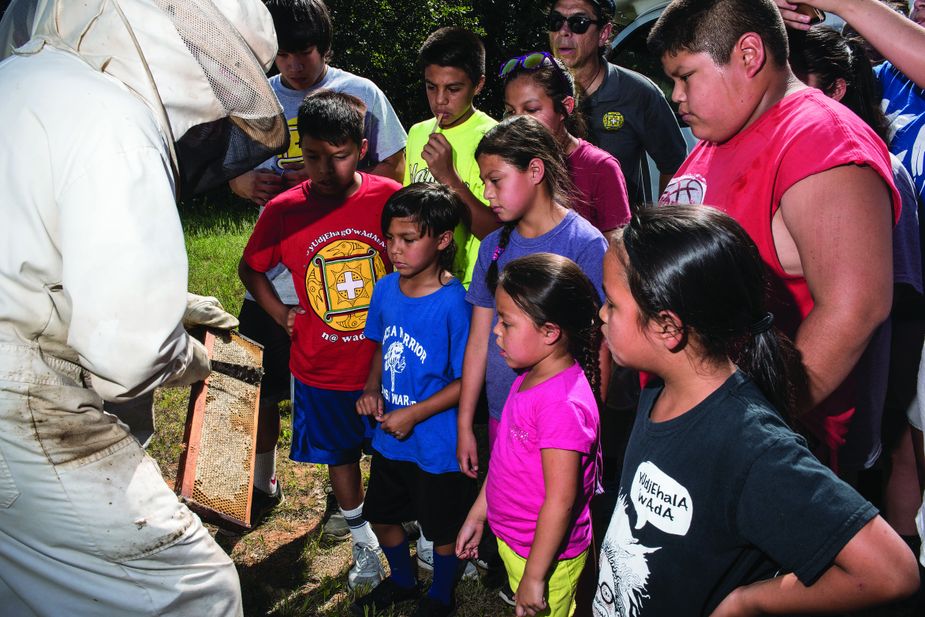
Children in the Yuchi after-school and summer language programs often take field trips. In 2016, they visited a local beekeeper.
Students in the Sauk Multimedia Technology Language pilot program have been increasing their twenty-first century technology competence alongside their language skills through web design and multimedia classes. During this year’s annual powwow, for example, students recorded interviews with powwow dancers and singers in Sauk. But all these programs, and the success of any language revitalization effort, have one essential need.
“What you’re able to do depends on the amount of money you have,” says Grounds. “The boarding schools were like a battering ram used to pummel our language communities for generations in a very ugly and brutal way. They were very well funded. If we spent as much money today as they did to get rid of Native languages, we’d have the funds we need to bring the next generations on board.”
Funding for Native language preservation initiatives is sporadic at best, and those involved with the programs agree it is not enough simply to keep the languages alive. In addition to funding issues, the biggest challenges facing language education include recruitment and retention—finding young people willing to spend thousands of hours immersed in the language—the lack of teachers fluent in tribal languages, a lack of language textbooks, and finding a methodology that is effective for each tribe’s unique cultural context.
“It’s a big challenge to keep up the students’ morale, engagement, and interest,” says Grounds. “One of the most critical factors is having young people who understand the value of learning the language and who have the motivation necessary to overcome the inertia around the language issue, which is the result of many generations of colonial assault on our communities.”
Even for a program as extensive as the Cherokees’, a crisis of identity for second-language speakers is hindering speech in a public setting.
“We have this group of first language speakers,” says Boney. “And this other group of second language speakers, who don’t want to say that they are Cherokee speakers, because there is this social cachet for first-language speakers that the new speakers don’t have, so they are hesitant to identify as speakers.”
In terms of everyday encounters, there are not many opportunities for Cherokee students to speak the language. Cherokee isn’t used the way it once was in the community—it’s now mostly taught in a formal school setting. At home, there aren’t many spaces for students to use what they learn.
“It’s a fast world, and people don’t have time to sit around and talk in Cherokee like we did when I was a kid,” says Thompson. “Nowadays, it seems like even the native speakers don’t speak much Cherokee any more—it’s just so much easier to speak in English. And a lot of people don’t teach Cherokee to their kids because they say, ‘This is a white world, and learning Cherokee isn’t going to get you a job.’ That’s what a lot of families tell their kids.”
Highlighting challenges like these, language preservationists agree that Oklahoma’s native languages are passing through a crucible that few will survive unless immediate and sustained long-term actions, backed by adequate funding, are taken. Language programs are on the front lines of this long war.
“When a language dies, the loss to a tribal community—and the world—is beyond measure,” wrote the Sac and Fox tribe’s Jacob Manatowa-Bailey on culturalsurvival.org, an online portal advocating for indigenous people’s rights. “Entire systems of thought, belief, and practice become permanently removed from the storehouse of human knowledge. . . . When you remove a people from their language, you cut out the heart of their identity.”
It is this identity that language preservationists like those in the Cherokee, Yuchi, and Sac and Fox nations are working so hard to secure.
“Prior to colonization and language loss, communication, songs, prayers, and stories were all done in the language,” says Manatowa-Bailey. “When you don’t have a language, those things either have to happen in translation, or they stop altogether. That it’s become less pure is not something I buy into. Can people learn to do things in another language? Yeah, they can. Does it affect your identity? Yeah, it does. It affects your sense of self.”
The Yuchi Tribe of Indians offers classes for parents and interested community members. (918) 224-7017 or yuchilanguage.org. The Sac and Fox Nation has Sauk language resources online at talksauk.com. The Cherokee Nation offers online language classes. (918) 968-0070 or cherokee.org.

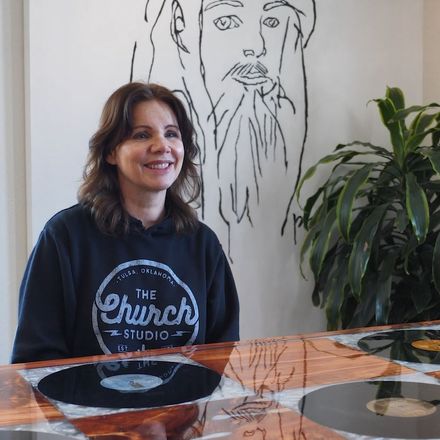
.png)



